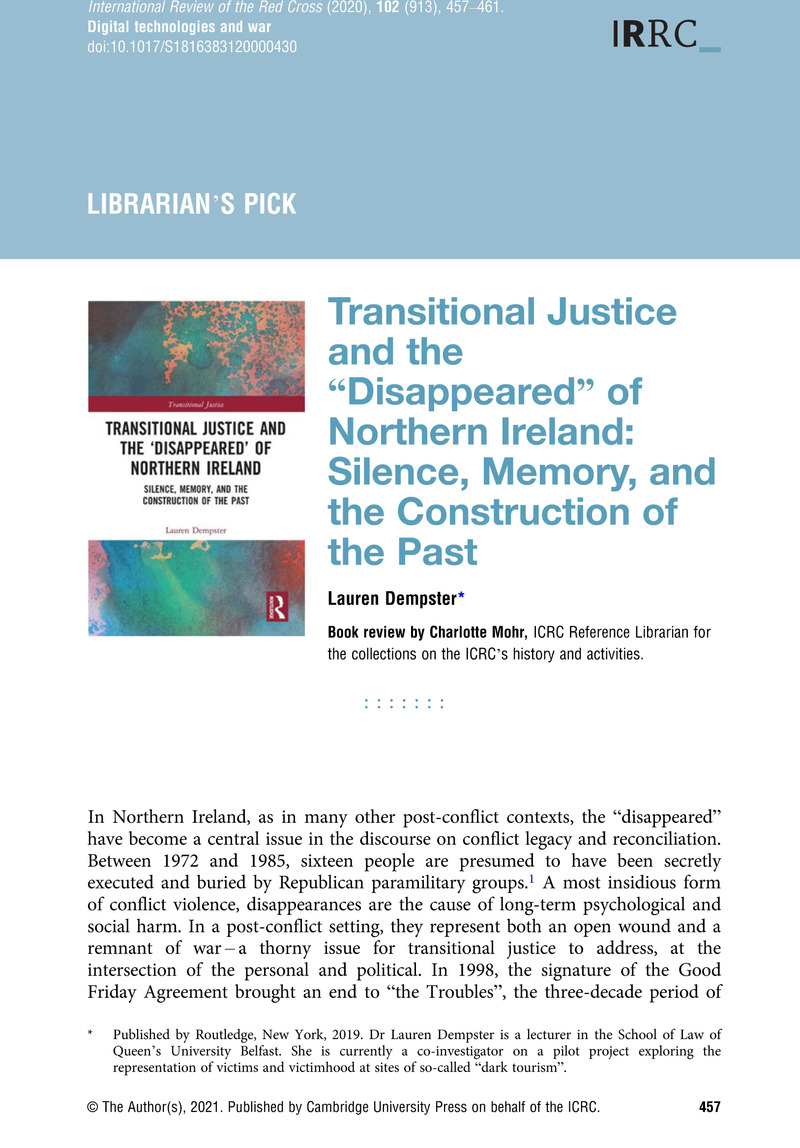No CrossRef data available.
Article contents
Transitional Justice and the “Disappeared” of Northern Ireland: Silence, Memory, and the Construction of the Past Lauren Dempster *
Published online by Cambridge University Press: 21 January 2021
Abstract

- Type
- Books and articles
- Information
- International Review of the Red Cross , Volume 102 , Issue 913: Digital technologies and war , April 2020 , pp. 457 - 461
- Copyright
- Copyright © The Author(s), 2021. Published by Cambridge University Press on behalf of the ICRC.
Footnotes
Published by Routledge, New York, 2019. Dr Lauren Dempster is a lecturer in the School of Law of Queen's University Belfast. She is currently a co-investigator on a pilot project exploring the representation of victims and victimhood at sites of so-called “dark tourism”.
References
1 The Provisional Irish Republican Army (IRA) has admitted responsibility for the disappearance of thirteen of the sixteen victims, mostly in one main statement dated 1999, and the Irish National Liberation Army for one additional victim. The Republican discourse on the issue has mainly remained consistent, if less vehement with time: the disappearances have been presented as the result of internal disciplinary measures carried out against informants or individuals accused of stealing IRA weapons.
2 The online catalogue is available at: https://library.icrc.org/library/. For the most recent publications, see: https://library.icrc.org/library/search/date. For more information on the research guides, see: blogs.icrc.org/cross-files/category/research-guide. To subscribe to the IHL Bibliography, email library@icrc.org with “IHL Bibliography subscription” in the subject line.
3 The 2014 Stormont House Agreement between the British and Irish governments included a series of measures to deal with legacy issues of the Northern Irish conflict: the creation of a Historical Investigation Unit overseen by the Northern Ireland Policing Board, potentially opening the door to prosecutions for crimes committed during the Troubles; an Independent Commission on Information Retrieval; an Implementation and Reconciliation Group; and an Oral History Archive project. A lack of political consensus has delayed the implementation of these measures of the Agreement since its adoption.
4 A list of interviewees is provided at the end of the book, except for four individuals who wished to remain anonymous.
5 Some scholars have challenged the common assumption of truth commissions as paving the way to impunity, however. See, for example, Priscilla B. Hayner's highly regarded empirical review of truth commissions, Unspeakable Truth: Facing the Challenge of Truth Commissions, New York: Routledge, 2011.
6 The central implication of this “enormous compromise”, as the author calls it on p. 81, is that the information uncovered by the ICLVR will lead neither to the public identification of perpetrators and of the motives for their crimes, nor to their criminal prosecution.
7 Transitional Justice and the “Disappeared” of Northern Ireland, p. 235.
8 As synthetized by McEvoy, Kieran and Mallinder, Louise in “Amnesties in Transition: Punishment, Restoration and the Governance of Mercy”, Journal of Law and Society, Vol. 39, No. 3, 2012, p. 412CrossRefGoogle Scholar. Quoted in Transitional Justice and the “Disappeared” of Northern Ireland, p. 183.




